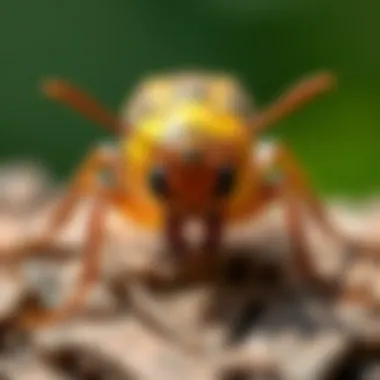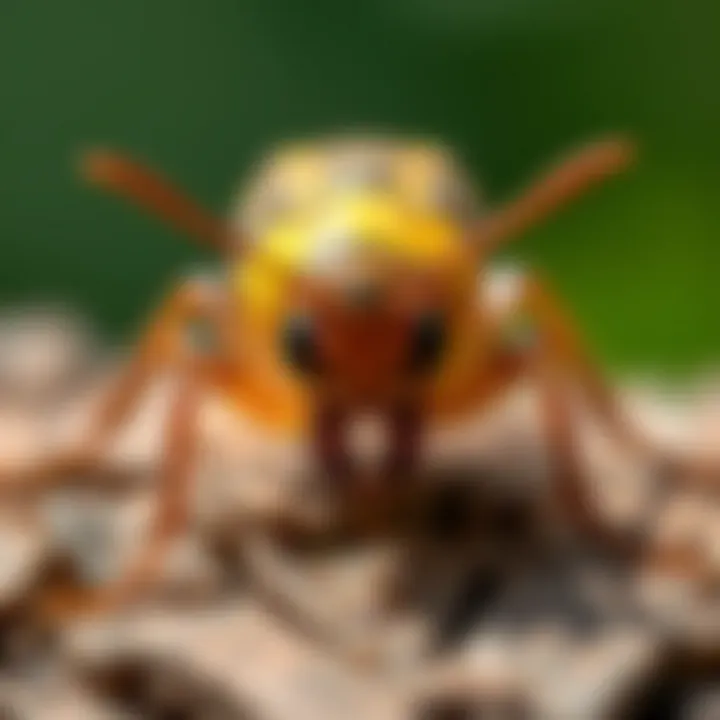Comprehensive Exterminator Services in Medford, Oregon


Intro
Pests can turn a peaceful home into a nightmare before you even realize what's happening. For residents of Medford, Oregon, this isn't just a possibility—it's a reality that many face. This area, with its unique climate and abundant nature, presents an inviting landscape for a variety of pests. Recognizing the signs of an infestation early on can save homeowners from significant damage and discomfort. In this exploration, we will take a look at pest identification, delve into effective prevention strategies, and examine various treatment options for those pesky invaders.
Pest Identification
Understanding the pests that frequent Medford homes is the first step towards effective management. In this section, we will cover some of the common culprits.
Detailed Descriptions of Common Pests
Medford homeowners commonly encounter several pest species, including:
- Ants: The most notorious are the pavement ants and carpenter ants. Pavement ants are small, about 1//8 inch long, and blackish or brown. Carpenter ants tend to be larger, usually around 1/4 - 1/2 inch, and prefer wood.
- Cockroaches: Notably, the American and German varieties can easily be found. The American cockroach is quite large, around 1.5 inches long, and often seen scurrying in kitchens and cabinets.
- Rodents: Norway rats and house mice are common. The Norway rat is large, sometimes exceeding a foot in length, while house mice are smaller, about 3-4 inches long.
- Wasps: Yellow jackets and paper wasps. Yellow jackets are aggressive and can create nests in or around homes, while paper wasps are less aggressive and form umbrella-shaped nests.
- Termites: They damage wooden structures, often unnoticed until significant harm has been done.
Signs and Symptoms of Infestations
Each pest species has specific signs indicating their presence:
- Ants: Look for small trails leading to and from food sources.
- Cockroaches: You may notice droppings resembling coffee grounds or small dark specks in kitchens or bathrooms.
- Rodents: Evidence includes gnawed items, droppings, and visible nesting materials like shredded paper or fabric.
- Wasps: Spotting nests near windows or eaves can indicate their presence.
- Termites: Watch for mud tubes along walls and hollow-sounding wood.
"Early detection is half the battle in pest management. To keep those critters at bay, know what to look for before the problem escalates."
Prevention Strategies
While identifying pests is crucial, prevention is a proactive tactic every Medford homeowner should adopt.
Home Maintenance Tips for Pest Prevention
- Seal Entry Points: Inspect your home for cracks or openings. Make sure to seal gaps around windows and doors.
- Proper Food Storage: Keep food in airtight containers and promptly clean up spills or crumbs.
- Garbage Management: Dispose of garbage properly and keep trash cans tightly closed.
- Landscaping Considerations: Avoid allowing vegetation to grow close to the house to decrease hiding spots for pests.
Natural Deterrents and Barriers
- Essential Oils: Peppermint, tea tree, and eucalyptus oils can repel various pests. Mix with water in a spray bottle and apply around entry points.
- Diatomaceous Earth: Scatter food-grade diatomaceous earth around your home. This non-toxic powder can cut through the exoskeletons of insects, leading to dehydration and death.
Treatment Options
If pests have taken over, taking action with effective treatment options is essential.
Overview of Chemical vs. Natural Treatments
- Chemical Treatments: Provide quick knockdown of pest populations but should be used cautiously, especially around pets and children.
- Natural Treatments: Often safer for household use. Options like boric acid for cockroaches and traps for rodents can offer good alternatives without harsh chemicals.
Step-by-Step Guides for DIY Treatments
- For Ants: Mix equal parts vinegar and water in a spray bottle. Spray areas where you see ants and their trails.
- For Cockroaches: Place boric acid in areas where they are spotted. Be sure to keep it out of reach of children and pets.
- For Rodents: Set snap traps along walls where droppings are found. Bait with peanut butter for best results.
Providing a clear understanding and representation of exterminator services will help homeowners in Medford manage their pest hurdles effectively, ensuring their home remains a sanctuary.
Prelude to Extermination Services
Extermination services play a critical role in maintaining a healthy living environment. In Medford, Oregon, where diverse climates provide a welcoming haven for various pests, understanding extermination is essential. Homeowners are not just dealing with minor inconveniences; they are safeguarding their homes from significant damages and health risks. Pest infestations can lead to structural deterioration, illnesses, and emotional stress, underlining the need for effective pest control strategies.
The sheer variety of pests that inhabit the Medford area presents unique challenges. Common invaders such as termites, rodents, and ants are just a few examples of what residents may face year-round. This necessitates the involvement of professional exterminators equipped with specialized knowledge and tools. Experts have undergone extensive training and are familiar with the local pest landscape, enabling them to devise tailored solutions for each specific case.
Not only do these professionals save time, but they also ensure safety during extermination procedures. Many pest control methods employ potent chemicals that, if not handled properly, could pose health risks to people and pets alike. Professional exterminators know how to manage these substances responsibly, putting effective protocols in place to minimize exposure.
Moreover, there's a considerable advantage in adopting an integrated pest management approach, which effective exterminators implement. This multi-faceted strategy focuses on prevention, monitoring, and control, ensuring that pests are not just eliminated but kept out for the long term. As a homeowner, engaging with these services can empower you to make informed decisions about pest management.
In summary, understanding extermination services goes beyond merely hiring someone to spray insecticide; it involves recognizing the importance of a comprehensive approach. The connection between effective pest control and the overall well-being of your home cannot be overstated. With Medford's diverse ecosystem at play, investing in professional extermination proves to be one of the smartest homeowner choices.
Understanding the Pest Landscape in Medford
Pest management in Medford, Oregon, isn't just about removing unwanted critters; it's about understanding the unique environmental factors that foster those infestations. Knowing the local pest landscape is crucial for homeowners looking to maintain a safe and comfortable living space. The importance lies not just in identifying pests but also in recognizing their behaviors and seasonal activities. This knowledge can empower residents to take pro-active steps before pests become a significant issue.
Common Pests in Medford
Termites
Termites are notorious for causing extensive damage to wooden structures, potentially leading to costly repairs. They thrive in the warm climate of Medford, often nesting in the damp wood of older homes. One key characteristic of termites is their ability to consume cellulose, which often goes unnoticed until it's too late. This makes early detection vital. Unfortunately, their habits often go unnoticed until substantial damage is done, proving to be a sneaky adversary in maintaining homes.


Rodents
Rodents, like mice and rats, are common nuisances in Medford, especially in areas with abundant food sources and places to nest. With their remarkable ability to reproduce quickly, a small infestation can spiral into a larger problem in no time. They are particularly known for chewing through wiring and insulation, introducing potential hazards. Understanding their food and nesting habits can help homeowners take strategic steps to deter these pests effectively.
Ants
Ant populations can skyrocket during the warm months, looking for food and shelter. They are notorious for entering homes in search of sugary substances or protein-rich offerings. Their colonies can number in the thousands, and their reliability in finding food means that when you see one, there are likely hundreds more nearby. Awareness of their trails and nesting behaviors benefits homeowners in developing effective baits and barriers.
Spiders
While not often a property-damaging pest like termites, spiders can certainly induce fear in many homeowners. They are highly effective at controlling other pest populations, but an overabundance can mean an unsightly home and an unsettling atmosphere for many. Different species, such as the common house spider and the more concerning black widow, can be found in Medford. Knowing which species are lurking can help residents decide whether to evict these eight-legged neighbors or allow them to stay to manage their pest problems.
Seasonal Pest Trends
Spring Invasions
As the frost melts and flowers begin to bloom, many pests awaken from dormancy. This is the time when swarms of ants march out, and termites begin their destructive feeding habits. Spring invasions present the perfect opportunity for homeowners to start preventive measures, possibly using barriers and natural repellents to thwart initial entry points. Being on guard during this time can save a lot of headaches in the coming months.
Summer Activity
With warmer temperatures, pests literally become ramped up. Rodents are often seen scurrying about more, and larger flea issues can surface due to pets spending more time outdoors. Ant colonies thrive during summer, creating visible trails leading into homes. It’s imperative to stay vigilant; regular checks can help in promptly addressing any activity before it transforms into an infestation.
Fall Preparations
As temperatures begin to dip, many pests look to invade homes for warmth and sustenance. Taking preventative measures in the fall can help fortify barriers against entering pests. This includes sealing cracks and ensuring that food sources are properly stored. By preparing early, homeowners can drastically reduce the chances of being overrun this winter.
Winter Dormancy
Although many pests tend to hibernate during the winter months, it doesn’t mean they disappear altogether. It’s vital to keep homes free of food scraps and debris that may attract pests even in hibernation. Regular inspections of attics and basements can reveal any early signs of infestation, helping to act before spring comes around.
"Understanding the specific pest landscape in Medford allows homeowners to be proactive rather than reactive, ensuring a comfortable and pest-free home."
By being aware of the common pests, their seasonal cycles, and appropriate handling strategies, residents can manage their homes more effectively. Such knowledge translates to a safer and more pleasant living space, emphasizing the importance of understanding the local pest landscape.
The Role of Professional Exterminators
When it comes to keeping your home pest-free in Medford, understanding the role of professional exterminators is key. These experts are not just about getting rid of critters, but they play a significant part in developing strategic approaches to pest control that can save time and money in the long run. Whether you're facing a small ant problem or dealing with a more serious termite infestation, hiring a professional can make all the difference.
Why Hire a Professional?
Expertise and Training
Professional exterminators bring a wealth of knowledge to the table. Their training often goes beyond merely knowing how to apply pesticides. They understand the biology of pests, reproductive cycles, and the optimal ways to eliminate them while keeping your home safe. This level of expertise means they can accurately diagnose a problem, and provide tailored solutions. For instance, if you found a trail of ants in your kitchen, they won't just spray everything in sight; they'll trace that trail back to the source, ideally stopping future generations from making your pantry their home. This educational foundation makes hiring trained experts a wise approach for any homeowner facing pest challenges.
Access to Advanced Techniques
Exterminators have access to techniques and tools that the average homeowner simply doesn't. This includes methods like thermal imaging to detect hidden infestations, or baiting systems that target specific pests without putting the whole family at risk. These innovations mean you get results that might be hard to achieve with DIY methods. It's not just about Bayer's home products or off-the-shelf traps; professionals often have exclusive access to advanced treatments that can keep your home pest-free.
Safety Precautions
A big selling point for hiring professionals is the safety factor. Many insecticides can be harmful not just to pests but to humans and pets too. Trained exterminators are schooled in the safe handling and application of these substances. They adhere to federal, state, and local safety guidelines, which means they can manage any potential hazards effectively. You wouldn't want to risk the health of your loved ones by misusing products that could be harmful, so having a pro on the job gives peace of mind. This diligence in safety makes professional services a prudent option for many homeowners.
What Services Do Exterminators Offer?
Initial Inspections
One of the first things a professional exterminator will do is conduct an initial inspection. This step is vital because it sets the tone for everything that follows. Without properly identifying the issue, it’s akin to treating a fever without checking for its underlying cause. The thorough inspection helps them gather information about the extent of the infestation. Exterminators often utilize various tools and technologies for these checks, which bolsters their understanding of your pest problem and determines the best course of action. An adequate initial inspection can mean the difference between a quick fix and a prolonged battle against pests.
Integrated Pest Management
Integrated Pest Management (IPM) is a sustainable approach emphasized by professionals. This methodology not only focuses on eliminating pests but also incorporates preventive measures that address the conditions allowing pests to thrive. IPM usually encompasses monitoring, habitat modification, and, when necessary, applying interventions with the least risk to people and the environment. It's this holistic viewpoint that makes IPM a favored choice among professional services. With IPM, homeowners aren't just getting a one-time service, they're gaining an ongoing partnership in pest management.
Follow-Up Treatments
The importance of follow-up treatments cannot be overstated. Just one treatment isn’t enough, especially for stubborn pests like termites or bed bugs, as eggs and larvae can remain hidden. Generally, professional exterminators will schedule follow-up visits to ensure the tactics employed are effective over the long haul. These follow-ups can include re-inspections and further treatments, boosting the chance of successful pest elimination. Homeowners benefit from this continued vigilance, knowing that their investment in pest control is sustained through ongoing care.
DIY Pest Control: Pros and Cons
DIY pest control has been a hot topic among homeowners, particularly in places like Medford, Oregon, where the threat of pesky critters can loom large. The decision to take matters into one’s own hands presents both opportunities and challenges. On one hand, homeowners can save money and gain some knowledge about pest management. On the other hand, DIY methods may lead to ineffective results or even escalate the problem if not done correctly. It's a fine line to walk, one that requires careful consideration of methods and circumstances.


Common DIY Methods
Natural Remedies
Natural remedies are gaining popularity for pest control due to their environmentally friendly nature. These methods often utilize common household items like vinegar, baking soda, and essential oils. For instance, a mixture of vinegar and water can effectively deter ants when sprayed around entry points. Homeowners appreciate natural remedies since they generally pose fewer risks to children and pets compared to harsh chemicals. However, the effectiveness can vary significantly. While some individuals swear by these solutions, others find them to be less reliable, especially during significant infestations.
Commercial Products
Commercial products commonly line the shelves of grocery and hardware stores. These range from sprays to baits packed with specific chemicals designed to target pests. Many of these solutions showcase robust marketing messages that promise instant results. Some products, like those containing insect growth regulators, tackle pest issues from a unique angle by disrupting growth cycles. The advantage here lies in ease of use and often greater effectiveness compared to natural remedies. However, strict adherence to safety instructions is crucial since these products can be harmful if misused, creating a potential risk for households not equipped to handle them.
Traps and Barriers
Traps and barriers serve as a more hands-on approach to pest control. Pests such as rodents can be effectively managed using snap or glue traps. Additionally, barriers can prevent entry by sealing off cracks and gaps where pests might enter. The main appeal of traps and barriers is their straightforward execution; you can see results rapidly by catching a critter or blocking its path. However, setting the traps requires a good understanding of pest behavior to maximize efficiency. This method can also be labor-intensive, and certain traps may inadvertently impact non-target creatures.
When to Consider Professional Help
Severe Infestations
When the pest problem hits the fan and spirals into a severe infestation, that's the red flag calling for professional assistance. Perhaps you’ve tried your hand at managing a rodent problem with minimal success, and now you find yourself face-to-face with a dozen mice at midnight. The primary concern here is that severe infestations can undermine your health, property, and peace of mind. Rodents, for instance, are notorious for spreading disease, making it crucial to address the issue quickly. Professionals have the training and tools to tackle these infestations more effectively than any DIY method.
Health Risks
Acting on pest infestations becomes paramount when health risks emerge. Certain pests, like cockroaches, are known carriers of allergens that can worsen respiratory problems, especially in children and the elderly. Furthermore, pests such as ticks or fleas present risks of transmitting diseases. When guests or family members start falling ill after a rat or mosquito sighting in your home, that signals the necessity for expert intervention. Professionals can employ targeted strategies to eliminate health risks while ensuring your living environment is safe and sanitary.
Complex Problems
Complex problems encompass a range of issues that require advanced pest management strategies. For instance, if your home deals with termite infestations, it’s not just about killing the pests but also about assessing damages and preventing them from wreaking havoc in the future. These multi-layered issues often cannot be resolved with simple DIY methods and necessitate comprehensive action plans only trained exterminators can provide. Engaging professionals often results in more than just immediate relief; it lays the groundwork for long-term solutions and safeguards.
Ultimately, weighing the pros and cons of DIY pest control against professional services in Medford requires a careful assessment of the situation. By considering the methods available and the potential repercussions, homeowners can make informed decisions that best protect their homes, families, and overall well-being.
Preventative Measures for Homeowners
Taking proactive steps can significantly minimize pest issues in your home. Preventative measures for homeowners not only save money but also ensure a healthier living environment. By being vigilant and addressing any potential risks, you can avoid a range of headaches associated with pest infestations.
Home Maintenance Tips
Maintaining your home properly is essential in keeping pests at bay. A few simple practices can prove to be very effective.
Sealing Entry Points
Sealing entry points is a vital part of pest prevention. Many pests tend to invade homes through tiny cracks and openings. By thoroughly inspecting the exterior of your home, you can find any gaps in windows, doors, and foundations.
Key characteristic: The main advantage of this approach is that it stops pests before they even step foot inside your home, acting as a barrier.
Unique feature: This method is also quite cost-effective. You don’t need expensive solutions, just some caulk or weather stripping. On the downside, it does require regular checks to ensure no new cracks appear, especially after harsh weather.
Proper Waste Management
Proper waste management is not just about good hygiene; it is about denying pests a food source. Keeping trash bins covered tightly and cleaning up spills promptly deters pests from sticking around.
Key characteristic: An organized trash management system is crucial for this reason. If rubbish remains accessible, it invites unwanted guests.
Unique feature: Investing in bins with secure lids is a simple yet effective feature. However, it may demand a bit of discipline from everyone in the household to maintain this habit, especially during busy times like holidays.
Landscaping Practices
Your landscaping practices also make a substantial difference. Maintaining your yard properly can minimize pest attraction and create a more inviting environment for beneficial insects.
Key characteristic: Regularly mowing the lawn and trimming bushes reduces hiding places for pests, making your outdoor space less appealing to them.
Unique feature: Well-maintained landscaping improves your home’s curb appeal too. However, overzealous landscaping can come with increased maintenance and potential costs in the long run.
Regular Inspections
Regular inspections go hand in hand with maintenance. Keeping an eye out for any signs of infestations can help mitigate problems before they escalate.
DIY Inspection Techniques
DIY inspection techniques allow homeowners to catch potential pest problems early. Regular checks in hidden corners, under sinks, and in attics can reveal early signs of infestations.


Key characteristic: This approach is especially good for those who prefer hands-on involvement in household maintenance. It empowers homeowners to be proactive.
Unique feature: It can save on professional inspection fees. However, the downside is that some might overlook subtle signs or not know what to look for, leading to missed infestations.
When to Call a Professional
Knowing when to call a professional is crucial. If you spot signs of pest activity or suspect an infestation, getting help is often better than waiting.
Key characteristic: Professional pest control carries the training and experience necessary to handle complex infestations effectively.
Unique feature: They have access to a wide range of treatments not available to the average homeowner, ensuring the problem gets sorted efficiently. The downside? It can incur a cost that some may find steep, depending on the extent of the issues.
Signs of Infestation
Understanding the signs of infestation can help homeowners act promptly. Common indicators include droppings, nests, and unusual sounds coming from walls or ceilings.
Key characteristic: These signals can provide vital information about the type of pest and where it might be located.
Unique feature: Keeping an eye out for signs is a straightforward act that gives homeowners insight into their homes' health. Yet, some signs can be misleading and might require professional input for clarification.
Legal and Ethical Considerations
In tackling pest management in Medford, understanding the legal and ethical framework surrounding exterminator services is crucial. Not only does it shape how pest control companies operate, but it also influences homeowner expectations and practices. Familiarity with regulations can safeguard homeowners from potential liabilities while choosing the right exterminator. Moreover, ethical considerations drive pest control methods towards humane and environmentally responsible practices. This section delves into key aspects of the regulation of pest control services and the ethics involved, ensuring that you are well-informed in your pest management journey.
Regulation of Pest Control Services
Licensing Requirements
The licensing of pest control services stands as a pillar in regulating the extermination industry. In Oregon, companies must be licensed by the Oregon Department of Agriculture. Obtaining a pest control license entails thorough training and examinations, ensuring that the exterminators are competent in their field. The key aspect of this licensing requirement is its role in guaranteeing a level of professionalism and standards among pest control technicians. Many homeowners find comfort in hiring licensed exterminators knowing that they have met established criteria and are held accountable under state laws.
However, some small businesses, eager to start quickly, might operate without a license, posing serious risks to homeowners regarding effectiveness and safety. An unlicensed operator may lack the requisite knowledge in pest management techniques, potentially leading to ineffective treatments and further infestations.
Safety Guidelines
Safety guidelines govern how pests are managed and what precautions must be taken during extermination. These guidelines are in place to protect both exterminators and clients from hazardous chemical exposure. Common protocols include wearing personal protective equipment (PPE) and adhering to proper application practices for treatments. This framework not only ensures the safety of individuals on-site but also lends credibility to professional services. Homeowners appreciate companies that prioritize safety, as compliant exterminators tend to foster trust and peace of mind throughout the treatment process.
Yet, enforcement of these guidelines can sometimes be inconsistent, allowing unscrupulous operators to cut corners. This inconsistency emphasizes the need for homeowners to actively research and inquire about the safety protocols their chosen exterminators practice.
Environmental Considerations
The environmental impact of pest control practices cannot be overlooked. Regulations dictate that pest control operations must consider their effects on local ecosystems. In Medford, where the natural beauty draws many residents, pest control companies must strive to balance effective pest management with environmental stewardship. This means utilizing Integrated Pest Management (IPM) strategies, which emphasize environmentally friendly methods, such as using less toxic pesticides and promoting biological control.
Why is this relevant to homeowners? Environmental considerations lead to healthier homes and communities. Pesticides that are less harmful not only protect beneficial insects and wildlife but also minimize chemical exposure for families and pets. However, as effective as these practices can be, not all pest control services prioritize them, making it essential for homeowners to ask about the methods employed.
Ethics in Extermination
Humane Pest Control Methods
Humane pest control methods focus on minimizing harm to animals while effectively managing pest populations. These methods often involve relocating pests rather than exterminating them. This aspect speaks to the growing awareness and demand for more compassionate approaches to dealing with wildlife. Many Medford homeowners appreciate exterminators who utilize humane strategies, as it aligns with a more ethically sound perspective on pest management. Nonetheless, there are challenges related to humane methods, such as potential limitations on effectiveness for certain pests or species that re-invade the area after relocation.
Responsible Use of Chemicals
Responsible use of chemicals is not just a guideline but an ethical imperative in pest control. Exterminators must focus on using pesticides judiciously and only when necessary. This principle safeguards not only the environment but also the health of everyone involved. Homeowners benefit significantly from choosing services that prioritize responsible chemical use, as it minimizes the risk of contamination in their living spaces. However, there can be drawbacks—the reliance on non-chemical methods may sometimes prolong the process for achieving complete pest eradication, requiring patience.
Community Impact
Lastly, considering the community impact of pest control methods plays an essential role in the overall ethics of extermination services. Best practices in pest management should extend beyond individual homes and look at their effects on neighboring properties. An exterminator’s choice of methods can influence not only their customers but also the wider community. If one home is treated with potent chemicals, it could potentially affect adjacent gardens, wildlife, or even water sources, highlighting the necessity for a community-centered approach.
This awareness drives many responsible pest control professionals to engage in practices that minimize negative community impacts, thus promoting a healthier environment for everyone.
Understanding these legal and ethical considerations arms homeowners in Medford with the knowledge needed to make informed choices when selecting exterminator services. Recognizing licensing standards, safety guidelines, responsible practices, and humane methods can lead to better pest management strategies that respect both home and environment.
Epilogue: Making Informed Decisions
In the multifaceted realm of pest control, making informed choices unveils a pathway for homeowners to effectively safeguard their sanctuaries from unwelcome critters. In Medford, where the pest landscape is as diverse as the charming neighborhoods, understanding one's options can spell the difference between a comfortable home and a persistent infestation.
A key element in reaching informed decisions is conducting thorough research on available exterminator services. Not every pest problem demands professional intervention; understanding the extent of the infestation plays a pivotal role in determining the next steps. Homeowners should consider the severity of the issue, whether it be a casual ant line or a more daunting rodent incursion. Familiarity with local professionals can also empower homeowners in their decision-making process. Checking reviews online or reaching out to neighbors can lead to discovering reliable exterminators in the area.
Another aspect worth pondering is the potential costs involved versus the benefits of hiring a professional service. While, initially, the prices might raise eyebrows, think of future savings on property damage and health-related concerns. Effective pest management not only resolves current issues but also provides preventive measures to thwart future invasions. This long-ranging thinking can avert the headaches of recurring pest issues.
Moreover, choosing the right extermination method represents another critical layer of this information pie. Between natural remedies and chemical treatments, the selection hinges on various factors such as the type of pest, the environment, and any specific health concerns within the household. Families with small children or pets might prefer eco-friendly methods, while those facing urgent situations might lean toward faster-acting chemical solutions. Understanding the pros and cons of each option ensures that chosen methods align with the homeowner's values and circumstances.
In summary, knowledge is power. The more homeowners learn about pest control methods and available services, the better equipped they are to make smart decisions regarding their homes.
As the article has detailed, pest control isn’t merely about elimination. It's about establishing a refined balance in the living environment, ensuring both comfort and safety. By embracing the guidance provided and remaining proactive, residents in Medford can cultivate pest-resistant homes, enhancing their quality of life. It all boils down to asking the right questions and seeking the appropriate answers, thereby turning pest problems from inevitable occurrences into manageable challenges.



